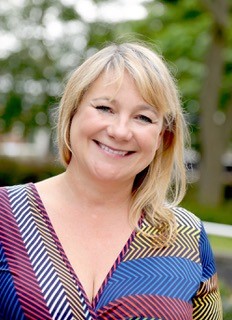A Curriculum of Hope
An on demand event jointly hosted by the NAHT and Discovery Education
In this webinar we’ll introduce some of the ideas outlined in the NAHT Discovery Education Pathway course A Curriculum of Hope and explore some of the issues around curriculum design facing our schools. For the past 15 years I’ve worked across primary and secondary schools, specifically exploring the potential in the curriculum to build not just a ‘knowledge rich’ model but also a ‘humanity rich’ one that places the empowerment of children at its heart. In order to achieve this we have to ask of ourselves, “What is the purpose of education?” If it is to create capable, compassionate and creative citizens of the future, how do we do that without engaging with the realities of that future? And is it right to always focus on the future at the expense of the present? How do we as leaders balance the need for results in order to give us the freedom from accountability so that we have the space to innovate and explore what entitlements we might offer children and what toll does that take on us? These are some of the key questions we’ll examine in this webinar.
The Pathway course take us through some of the key ideas underpinned in the book Curriculum of Hope and explores the five pillars underpinning the thinking in that book – namely that a strong curriculum will place equal emphasis on Credibility (or content), Coherence, Compassion, Creativity and Community. When combined, these pillars extend the curriculum beyond the core national curriculum into something in which the future and present are compatible – where the child can be a child but developing the competencies, knowledge, thinking skills, confidence and capacity to engage with complex situations that they will find themselves needing in the future, but within a context in which they can be playful, active and impactful.
To this end we need to explore the problems that beset us when we think of curriculum. It seems fitting that the word curriculum has its roots in the Latin “currere” – to run a course. It seems that’s what we do – set children off on a race, a running course – with the expectation that there will be winners and losers. It is a course that allows few diversions or second chances and in our current system, there are no staggered starts. The English education system seems somewhat blind to the fact that some children will run further and harder than others in order to try to end up at the same point. In his book Thinking Allowed Mick Waters refers to the searing inequalities of the ‘inside lane’ and ‘outside lane’ or “gutter” in this race and our inability to adequately provide structures to support those on the outside. And in the recently published Timpson report into exclusions in England and Wales, we see a worrying trend to bump children off the track altogether in the pursuit of appearing to have improved the outcomes of a school.
Schools are under extraordinary pressure to ensure that young people complete this course and it can feel like only the finishing position matters. While Ofsted have recently amended the focus of their inspection framework to include an expectation that schools will be providing a broad and balanced curriculum for pupils, the fact that they have been complicit in creating a ‘teaching to the test’ culture in the past seems to have been ignored. While the focus on the importance of a broad curriculum is to be welcomed, there are significant constraints on schools, not least of all, financial constraints, that make this harder than it might be. Nevertheless, there are many ways that schools can ensure that pupils have a broad, positive experience of a curriculum that is created not only to please inspectors, but to give children the very best chances of a successful future – one that not only has academic goals in mind, but that considers broader personal well-being and social responsibility. A Curriculum of Hope is one that offers possibilities not only to children, but to the wider community and which unashamedly attempts to build a better world.
If you would like further information about the Pathway programme please visit www.discoveryeducation.co.uk/NAHT
Speakers

Debra Kidd
Debra Kidd has worked in education for twenty-six years, teaching children from the ages of 4 through to post-graduate Master’s students. She trained initially as an English and Drama teacher in secondary education before making her way into primary and has been an AST, Head of Department, Assistant Head and Senior Lecturer along the way. She has worked in both mainstream and special settings.
Debra is an Associate for Independent Thinking Ltd. She is an Artistic Director with the International Schools’ Theatre Association and has worked with young people creating theatre all over the world. She has also been involved in education in more disadvantaged areas including the Kakuma refugee camp in Kenya and is involved in education projects advocating for the rights of refugees.
She is the author of three books: ‘Teaching: Notes from the Frontline’ (2014), ‘Becoming Mobius’ (2015) and “A Curriculum of Hope (2020). She co-authored “Uncharted Territories: Great Adventures in Learning” (2018) with Hywel Roberts and has contributed chapters to seven other books, is a regular columnist for Teach Primary and Teach Secondary and has written for The Guardian.
In 2014 Debra co-founded Northern Rocks – one of the largest teaching and learning conferences in the UK. She has a doctorate in Education and works with Leeds Beckett university on their international online PGCE courses and for several SCITT providers across the North West of England, supporting Initial Teacher Training. She works internationally as a presenter, teacher trainer and speaker, but is often to be found in a classroom with children working as a travelling teacher and practising what she preaches.
Andrew Hammond
Senior Director of Learning at Discovery Education
Andrew served in schools for over 20 years, as class teacher, Head of Department, Deputy Head Teacher and Head Teacher in both independent and maintained sector schools. A prolific author, Andrew has written numerous titles for a range of educational publishers. He has a BA QTS from Bath and an MA from King’s College London. He is currently studying for an Ed.D at Buckingham, researching the power of culture to deliver character traits and attitudes in schools. He is interested in how schools turn values-based platitudes into practice and how we best support pupils’ personal and cultural development by supporting the personal development of their teachers. Andrew joined Discovery Education in September 2019 as Senior Director of Learning. He designed the Pathway Programme and is series editor for its content. He is passionate about supporting the whole teacher

